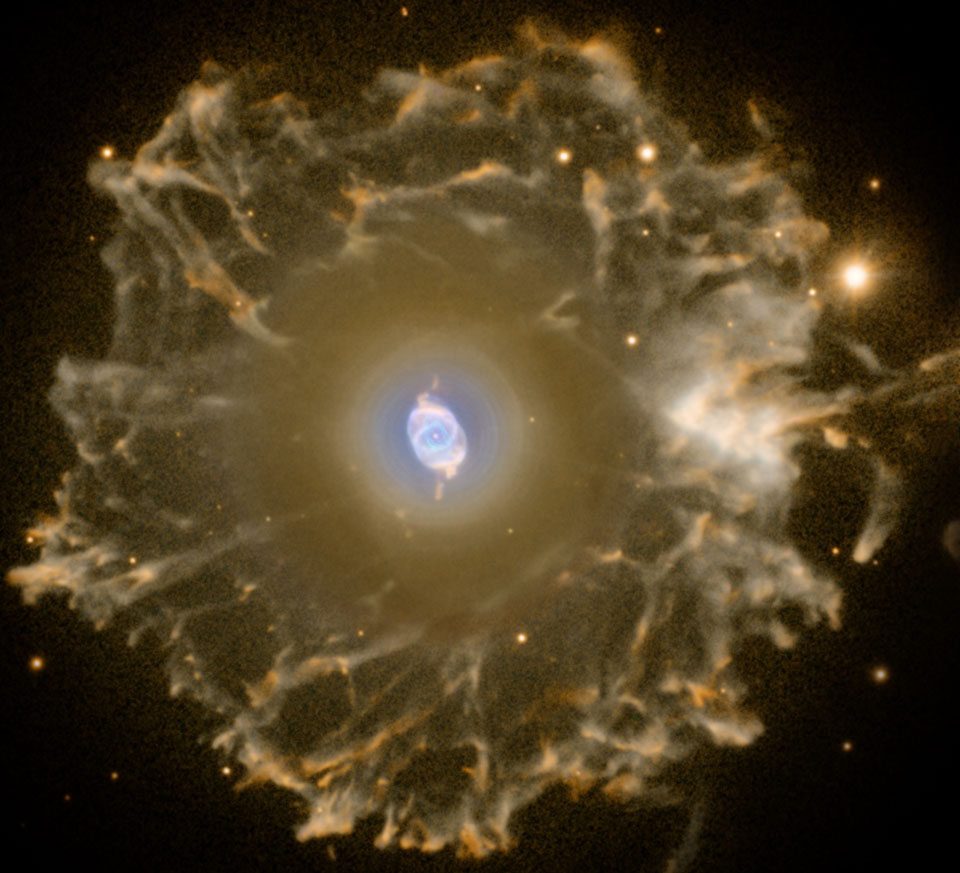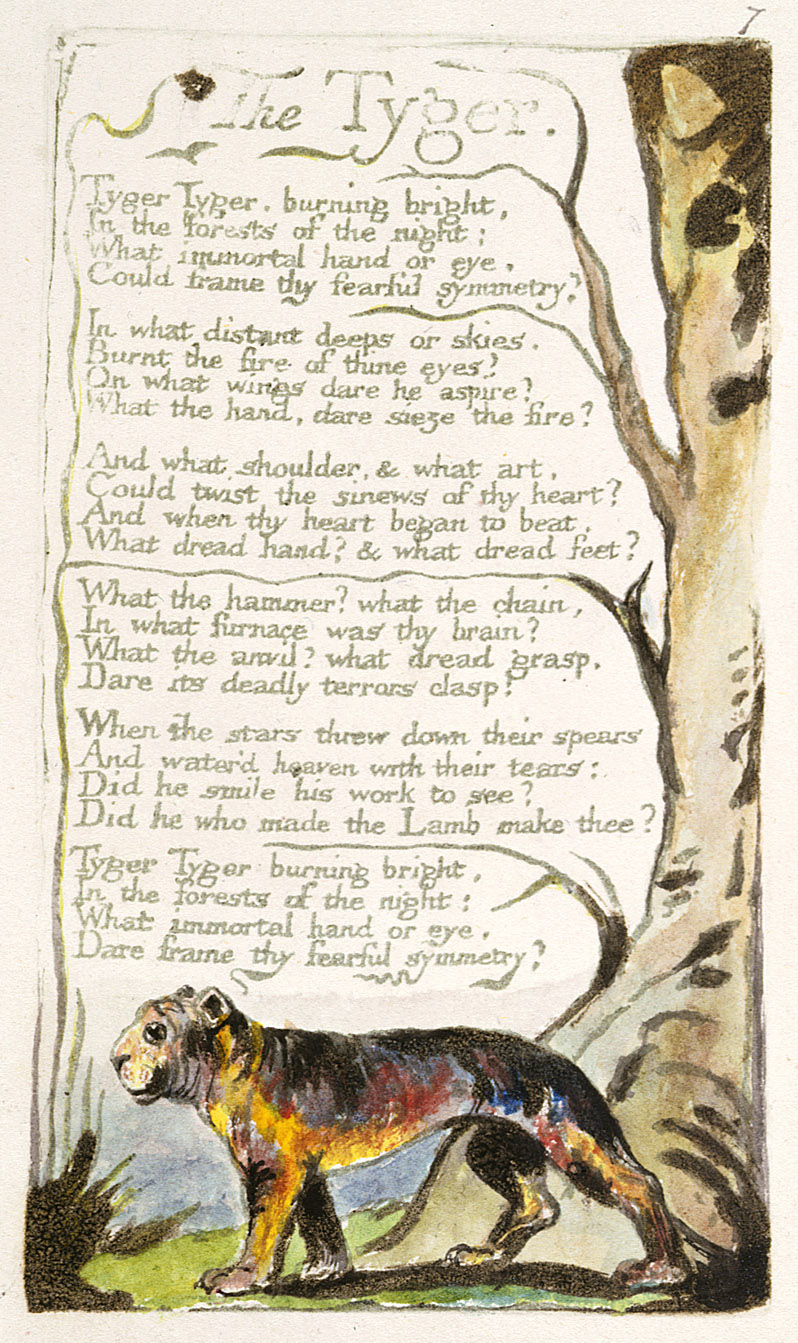Page 1 of 1
APOD: Halo of the Cat's Eye (2020 Jun 07)
Posted: Sun Jun 07, 2020 4:05 am
by APOD Robot
 Halo of the Cat's Eye
Explanation:
Halo of the Cat's Eye
Explanation: The
Cat's Eye Nebula (NGC 6543) is one of the best known planetary nebulae
in the sky. Its haunting
symmetries are seen in the very central region of
this stunning false-color picture, processed to reveal the enormous but extremely faint halo of gaseous material, over three
light-years across, which surrounds the brighter, familiar
planetary nebula. Made with data from the
Nordic Optical Telescope in the
Canary Islands, the composite picture shows extended emission from the nebula.
Planetary nebulae have long been appreciated as a final phase
in the life of a Sun-like star. Only much more recently however, have some planetaries been
found to have halos like this one, likely formed of material shrugged off during earlier active episodes in the
star's evolution. While the
planetary nebula phase is
thought to last for around 10,000 years, astronomers estimate the age of the
outer filamentary portions of this halo to be 50,000 to 90,000 years.
Re: APOD: Halo of the Cat's Eye (2020 Jun 07)
Posted: Sun Jun 07, 2020 10:44 am
by orin stepanek
Reminds me of a beautiful flower, burst into bloom!

Re: APOD: Halo of the Cat's Eye (2020 Jun 07)
Posted: Sun Jun 07, 2020 2:18 pm
by Ann
Re: APOD: Halo of the Cat's Eye (2020 Jun 07)
Posted: Sun Jun 07, 2020 4:10 pm
by neufer
Re: APOD: Halo of the Cat's Eye (2020 Jun 07)
Posted: Sun Jun 07, 2020 4:48 pm
by Sa Ji Tario
¿Can anyone explain what the spokes are like Japanese parasol rods seen in some images?
Re: APOD: Halo of the Cat's Eye (2020 Jun 07)
Posted: Sun Jun 07, 2020 5:14 pm
by Ann
neufer wrote: ↑Sun Jun 07, 2020 4:10 pm
Tyger Tyger, burning bright,
In the forests of the night;
What immortal hand or eye,
Could frame thy fearful
symmetry?
Ann
Re: APOD: Halo of the Cat's Eye (2020 Jun 07)
Posted: Sun Jun 07, 2020 5:17 pm
by ecdowney
If radius is proportional to time back, it looks like at first there was no rotation (outer third), then equal emission in all directions (middle third), and now leisurely rotation (inner third). Is this a correct interpretation? If so, what caused the change in rotation, perhaps asymmetric emission?
Re: APOD: Halo of the Cat's Eye (2020 Jun 07)
Posted: Sun Jun 07, 2020 6:08 pm
by orin stepanek
neufer wrote: ↑Sun Jun 07, 2020 4:10 pm
I thaut I saw a putty-cat! I don't think that's Sylvester though! 
Sylvester & Tweety today
>

- th.jpg (11.62 KiB) Viewed 3861 times
Picture from image results
Re: APOD: Halo of the Cat's Eye (2020 Jun 07)
Posted: Mon Jun 08, 2020 2:20 am
by ta152h0
Earth is a product of accretion of particles over a long time. What makes the center of the Earth a fireball? pass the ice cold one
Re: APOD: Halo of the Cat's Eye (2020 Jun 07)
Posted: Mon Jun 08, 2020 4:09 am
by Ann
ta152h0 wrote: ↑Mon Jun 08, 2020 2:20 am
Earth is a product of accretion of particles over a long time. What makes the center of the Earth a fireball? pass the ice cold one
Doesn't it have to do with radioactive decay in the large iron/nickel core of the Earth?
Ann
Re: APOD: Halo of the Cat's Eye (2020 Jun 07)
Posted: Mon Jun 08, 2020 3:00 pm
by johnnydeep
Sa Ji Tario wrote: ↑Sun Jun 07, 2020 4:48 pm
¿Can anyone explain what the spokes are like Japanese parasol rods seen in some images?
I don't seek "spokes" in this image of the cat's eye nebula, rather, there seem to be net-like filaments of denser gas. Not sure what causes that - perhaps magnetic fields? Or maybe it's just random density variations.
Re: APOD: Halo of the Cat's Eye (2020 Jun 07)
Posted: Mon Jun 08, 2020 3:12 pm
by johnnydeep
Ann wrote: ↑Mon Jun 08, 2020 4:09 am
ta152h0 wrote: ↑Mon Jun 08, 2020 2:20 am
Earth is a product of accretion of particles over a long time. What makes the center of the Earth a fireball? pass the ice cold one
Doesn't it have to do with radioactive decay in the large iron/nickel core of the Earth?
Ann
Yes, plus two other factors. From
https://www.scientificamerican.com/arti ... s-core-so/ :
SCIENTIFIC AMERICAN wrote:There are three main sources of heat in the deep earth: (1) heat from when the planet formed and accreted, which has not yet been lost; (2) frictional heating, caused by denser core material sinking to the center of the planet; and (3) heat from the decay of radioactive elements.
All three phenomena are pretty amazing to me: that there is heat STILL left over from when the Earth formed 4.5 gys ago; that there is any significant amount of FRICTION caused just by slowly sinking rock; and that the core is full of radioactive elements!
The upshot is that were the sun to go dark, we could still survive for quite a long while by digging deep enough. Or at least we would be nice and warm. There's still the not so minor matters of oxygen and food to worry about

Re: APOD: Halo of the Cat's Eye (2020 Jun 07)
Posted: Mon Jun 08, 2020 3:17 pm
by johnnydeep
ecdowney wrote: ↑Sun Jun 07, 2020 5:17 pm
If radius is proportional to time back, it looks like at first there was no rotation (outer third), then equal emission in all directions (middle third), and now leisurely rotation (inner third). Is this a correct interpretation? If so, what caused the change in rotation, perhaps asymmetric emission?
Interesting conjecture. I'm not sure the different appearances of the various layers reflects rotational speed. But, I think it would be true that as material was ejected, it would steal angular momentum from what remained causing it to rotate more slowly?
 Halo of the Cat's Eye
Halo of the Cat's Eye



